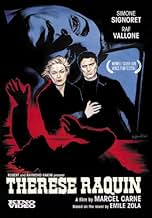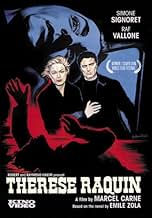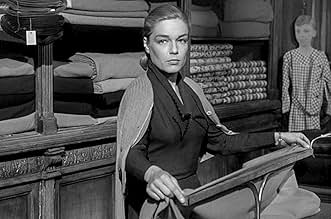Thérèse Raquin
- 1953
- Tous publics
- 1h 42min
NOTE IMDb
7,4/10
2 k
MA NOTE
Un chauffeur de camion tue le mari de la femme qu'il aime et devient l'objet de chantage.Un chauffeur de camion tue le mari de la femme qu'il aime et devient l'objet de chantage.Un chauffeur de camion tue le mari de la femme qu'il aime et devient l'objet de chantage.
- Réalisation
- Scénario
- Casting principal
- Récompenses
- 2 victoires et 2 nominations au total
Martial Rèbe
- Grivet
- (as Martial Rebe)
Francette Vernillat
- Françoise, la bossue
- (as Françoise Vernillat)
Madeleine Barbulée
- Madame Noblet, une cliente
- (as Madeleine Barbulé)
Avis à la une
Marcel Carné is mostly known for the films he made before the Second World War (such as "Le quai des brumes" (1938) and "Le jour se leve" (1939)), but also in 1953 he is still able to make an excellent film noir (for a change from the country that invented the name of this genre).
The somewhat forgotten Roger Hubert is responsible for the beautiful black and white photography and Simone Signoret plays the femme fatale. I always remember Signoret the way she looked in her later years, her appearance thoroughly neglected, and every time I see a movie from her early days I am amazed how beautiful she ones was.
The film begins rather weak. A young woman is married to a man that is silly in a caricatural way but does have a very attractive friend. There are more subtle ways to indicate that the film will be about adultery.
Over time however the film goes stronger and stronger. The surprising ending nearly equals that of "Diabolique" (1955, Henri Georges Clouzot), also with Simone Signoret. What was most interesting to me however was the middle part, the confrontation between the woman and the mother in law afer the dead of the husband. In reality these confrontations are confrontations of the woman with her own conscience. This part of the film resonates the work of writers as Poe and Dostojevski.
To conclude, something for the real filmbuffs. Maria Pia Casilio plays a tiny part as chambermaid in a hotel. From the first second I saw her I thought "I know that girl, she plays Maria in "Umberto D" (1952, Vittorio de Sica)". A little investigation proved that I was right, so I can count myself as a filmbuff.
The somewhat forgotten Roger Hubert is responsible for the beautiful black and white photography and Simone Signoret plays the femme fatale. I always remember Signoret the way she looked in her later years, her appearance thoroughly neglected, and every time I see a movie from her early days I am amazed how beautiful she ones was.
The film begins rather weak. A young woman is married to a man that is silly in a caricatural way but does have a very attractive friend. There are more subtle ways to indicate that the film will be about adultery.
Over time however the film goes stronger and stronger. The surprising ending nearly equals that of "Diabolique" (1955, Henri Georges Clouzot), also with Simone Signoret. What was most interesting to me however was the middle part, the confrontation between the woman and the mother in law afer the dead of the husband. In reality these confrontations are confrontations of the woman with her own conscience. This part of the film resonates the work of writers as Poe and Dostojevski.
To conclude, something for the real filmbuffs. Maria Pia Casilio plays a tiny part as chambermaid in a hotel. From the first second I saw her I thought "I know that girl, she plays Maria in "Umberto D" (1952, Vittorio de Sica)". A little investigation proved that I was right, so I can count myself as a filmbuff.
Despite the considerable talent involved, this tale of passion and murder is pallid stuff. It's filled with bald plot-twists, ending with the ultimate of deux ex machinas, a huge truck careening down a small street for no reason except to kill off a major character, thus creating the pat ironic ending. Every plot twist is unconvincing, from the idea that Vallone and Duby would hit it off in any context, or that the couple would plan to leave a day or so after they told her husband about their affair rather than immediately, to the mother conveniently having a totally paralysing stroke at just the right moment. I guess one can blame Zola for some of this, but this updated version adds nothing.
Not the best of Marcel Carne by any means but an intelligent, measured if somewhat conventional screen version of Zola's novel, nevertheless. Simone Signoret is "Therese Raquin", the married woman whose affair with truck-driver Raf Vallone leads to murder and blackmail. She is, of course, excellent but this is Vallone's movie; it is an effortless performance of an ordinary man caught up in events over which he has no real control. It's also superbly shot in Lyon by Roger Hubert and the updating to postwar France fits the plot perfectly. In an American setting this could be by James M. Cain though the climatic twist is neater than anything Cain might have given us.
Emile Zola wrote page turners. He focused on the injustices of the great unwashed of France, from miners to prostitutes. His books were incredibly naturalistic and moralistic. His characters seldom came through unscathed but made a statement about the cultural milieu of the time. This is a story about passion. Therese Raquin is the wife of a tiresome mama's boy hypochondriac. She is beautiful and is married to this childish wimp. Along comes the handsome truck driver after she has spent six empty years with this guy. They have tryst and even let the husband know that he is going to lose his wife. Everything changes when, on a train trip to Paris, fate takes over. Granted, there are lots of plot contrivances, but that's the literary style of the period. Also, in the naturalist tradition, the characters often lose control of their destinies. There is a broader moral sense that trumps the likable ending that people are used to in movies made at this time. The writer and the director can't turn their backs on issues like these and so life goes on and the impulsive and evil are punished alike.
Therese Raquin (1953)
You may be familiar with the lead actress, Simone Signoret, from Les Diaboliques, made a year after this film, and she plays a similar conflicted or complex, strong type of woman in a sordid world. She plays the title character, based on a Zola story, who is swept into a romance she doesn't completely expect and then a murder that she doesn't completely abhor.
And she is rather brilliant, a slightly different type than American actresses of the time, but commanding in her stoic intelligence. The two men are both first rate, one a foreign (Italian) charmer and the other a sharper fellow who is only slightly over his head. In fact, everyone is just slightly extended into decisions they don't quite know how to make. The fact that things go wrong is just part of great drama, and part of life, too.
The filming (photography and editing) is totally gorgeous here, The plot progresses slowly enough it might seem to drag, but I think it works in the long run, setting a deliberate and inevitable pace to events. What is maybe weakest is the ending, where things get a little spectacular, perhaps in a fascinating way, but certainly no longer believable.
Director Marcel Carne is no household name in this country, but the strength of this film alone makes me want to find others and get a feel for his style. Recommended for those who like drama, melodrama, and a sort of Euro-noir style, and who don't mind reading subtitles.
You may be familiar with the lead actress, Simone Signoret, from Les Diaboliques, made a year after this film, and she plays a similar conflicted or complex, strong type of woman in a sordid world. She plays the title character, based on a Zola story, who is swept into a romance she doesn't completely expect and then a murder that she doesn't completely abhor.
And she is rather brilliant, a slightly different type than American actresses of the time, but commanding in her stoic intelligence. The two men are both first rate, one a foreign (Italian) charmer and the other a sharper fellow who is only slightly over his head. In fact, everyone is just slightly extended into decisions they don't quite know how to make. The fact that things go wrong is just part of great drama, and part of life, too.
The filming (photography and editing) is totally gorgeous here, The plot progresses slowly enough it might seem to drag, but I think it works in the long run, setting a deliberate and inevitable pace to events. What is maybe weakest is the ending, where things get a little spectacular, perhaps in a fascinating way, but certainly no longer believable.
Director Marcel Carne is no household name in this country, but the strength of this film alone makes me want to find others and get a feel for his style. Recommended for those who like drama, melodrama, and a sort of Euro-noir style, and who don't mind reading subtitles.
Le saviez-vous
- AnecdotesRaf Vallone refused to be dubbed in the French version and had his contract amended accordingly. The scenario was also slightly changed to "Italianize" the character of Laurent.
- ConnexionsFeatured in Mémoires pour Simone (1986)
Meilleurs choix
Connectez-vous pour évaluer et suivre la liste de favoris afin de recevoir des recommandations personnalisées
- How long is The Adultress?Alimenté par Alexa
Détails
- Date de sortie
- Pays d’origine
- Langue
- Aussi connu sous le nom de
- The Adultress
- Lieux de tournage
- Sociétés de production
- Voir plus de crédits d'entreprise sur IMDbPro
- Durée
- 1h 42min(102 min)
- Couleur
- Rapport de forme
- 1.37 : 1
Contribuer à cette page
Suggérer une modification ou ajouter du contenu manquant



























